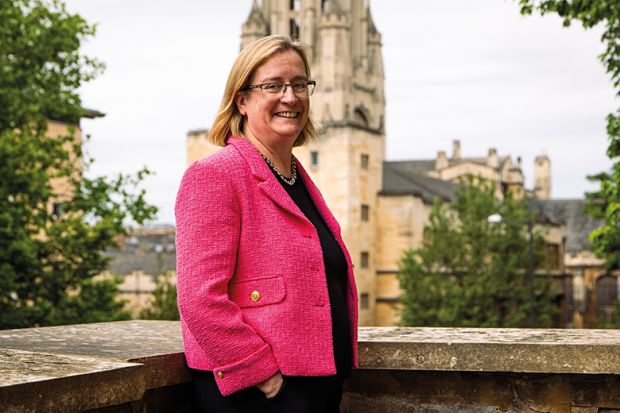Difficult conversations about renaming buildings are likely to restart when the University of Bristol publishes its long-awaited report on how it benefited from slavery. But its new vice-chancellor, the award-winning historian Evelyn Welch, seems to be relishing the discussions that lie ahead about Bristol’s controversial past, which famously led to the statue of slave trader Edward Colston being dumped by protesters in the city’s harbour in June 2020.
“It’s really important that we talk about these things – that we realise Britain became a global player at a time when slavery was expanding, and then there was the Industrial Revolution in the 19th century, and there is a connection between the two. Tea, coffee, sugar and things that sat in the shops in England were produced by people living in the most miserable circumstances,” reflected the Renaissance era expert, who was previously senior vice-president at King’s College London.
However, she worries that the debate about Bristol’s past will boil down to calls to rename buildings – most likely the Wills Memorial Building, named after the tobacco trading family whose wealth from slave-grown crops helped to establish the university in 1909.
“Rather than focus on a specific name, statue or building and say, ‘Right that’s done – let’s move on,’ we should think about the deep systemic relationship between debt, investments and trade in the late 17th century and early 18th century, and how slavery made huge wealth on both sides of the Atlantic possible,” said Professor Welch.
While Bristol will consult widely on these issues, removing the Wills name from university buildings seems to sit awkwardly with her. “The past is not full of goodies and baddies – individuals were often complex, and understanding that complexity and making it relevant today is what the university should do,” explained Professor Welch. “Pretending that removing a name will change the past? That past is something we sit with uncomfortably, and it should be uncomfortable.”
Other internal challenges also await Bristol’s first female vice-chancellor. Since the introduction of £9,000-plus tuition fees in 2012, Bristol’s student population has mushroomed to more than 27,000, up by 6,000 in the past five years alone. With a shortage of student housing, some freshers have been forced to take digs in Bath and even south Wales, prompting accusations of reckless over-recruitment. But Professor Welch has no plans to pause Bristol’s expansion.
“Bristol is still a medium-sized university – UCL has 40,000-plus students, King’s College London has 30,000-plus – and we need to continue growing and need to continue to offer education to those students who can benefit from it,” she said. “We will grow, but we will grow sustainably,” she added, stating that she was working with the University of the West of England, local authorities and housing providers on the issue of student accommodation. “There is no student living in Newport this year,” she noted.
Another significant issue facing Bristol relates to student suicides, with the university recently found culpable for failings related to the death in April 2018 of Natasha Abrahart. The university is now seeking to appeal that decision in the High Court, noting the multiple failings of mental health services in the case and its own efforts to help the 20-year-old physics undergraduate.
While Professor Welch cannot talk about the case, the issue of suicide is close to her heart. “My mother killed herself, and there is not a day that goes past when I wonder what I could have done to help her,” she said. “Bristol had a really difficult time around 2018 with a cluster of suicides which caused unimaginable pain for families, friends, staff and the whole university community – I understand that anguish. We want to take a whole-university approach so it never gets to the point where someone’s pain feels so extreme that they don’t feel they can go on.”
Despite these weighty issues, Professor Welch is clearly optimistic about Bristol’s and the sector’s fortunes, even hoping that England’s skills minister, Andrea Jenkyns, will drop the view that she expressed at the Conservative Party conference, that UK universities are peddling degrees in “Harry Potter studies” and “anti-British history”.
“That phrasing might have won some laughter in a room, but it’s not really helpful,” said Professor Welch, who reported that she found the new minister to be “engaging and enthusiastic” about her brief when they met a few months ago. “I’m sure we can work together.”
Any interview with Professor Welch is not complete without a mention of her more famous daughter, Florence Welch, lead vocalist in Florence and the Machine. Professor Welch is comfortably the third-most famous person in her family: her brother is the Hollywood actor-turned-director John Stockwell, who played Tom Cruise’s wingman Cougar in Top Gun.
On her daughter’s experience, Professor Welch reflected that pop stardom “is not glamorous and [is] incredibly hard work”, although it has some relevance for modern academia in how online and offline come together. “The music fan base is nowadays built online, but it will come together at a gig or festival – it’s similar for a lecture. You can do a lot online, but the learning experience only really comes alive when you’re in the same place with people who share that passion, too.”
Register to continue
Why register?
- Registration is free and only takes a moment
- Once registered, you can read 3 articles a month
- Sign up for our newsletter
Subscribe
Or subscribe for unlimited access to:
- Unlimited access to news, views, insights & reviews
- Digital editions
- Digital access to THE’s university and college rankings analysis
Already registered or a current subscriber? Login









